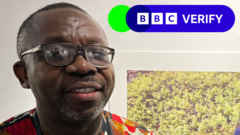In Nigeria, the belief in witchcraft poses severe dangers to those accused, often leading to violent mob justice and lynchings. At the forefront of the battle against these dangerous accusations is Dr. Leo Igwe, a passionate activist who founded the organization Advocacy For Alleged Witches to protect innocent people targeted by superstition.
“I could no longer take it,” Dr. Igwe expressed to the BBC. “You know, just staying around and seeing people being killed randomly.” Having earned a doctorate in religious studies in 2017, he was frustrated with academia’s limitations on actively addressing the harsh realities of witch-hunting and its devastating effects on society.
Dr. Igwe’s mission extends beyond mere advocacy in Nigeria; his efforts reach as far as Ghana, Kenya, Malawi, and Zimbabwe, aiming to raise awareness and develop strategies to save lives. He shared a harrowing case involving Jude, a 33-year-old glazier who was accused of witchcraft in August. Following a misunderstanding with a boy about his physical agility, Jude found himself targeted by a mob of about 15 people who accused him of causing the boy’s genital disappearance, a claim that echoes through West Africa linked to Koro syndrome, a form of mental illness characterized by the intense fear of genital retraction.
The aftermath was devastating for Jude, as he lost his job at the bank due to the stigma associated with the accusation. Dr. Igwe and his team intervened after witnessing a video of the incident circulated on social media. They provided financial and emotional support and launched efforts to reinstate Jude at work, pledging to cover his university fees to support his rehabilitation.
In Nigeria, the cultural fear surrounding witchcraft creates a breeding ground for accusations, frequently targeting society's most vulnerable members – the elderly, children, and those living in poverty. Dr. Olaleye Kayode, an academic at the University of Ibadan, attributes the prevalence of witch-hunting to the influence of external religions, which feed superstitions rather than dispelling them.
Highlighting the role of powerful Christian Pentecostal pastors, Dr. Igwe points to events framed within a “deliverance” context that further incite violence, labeling the accused as dangerous to society. A notable incident involved a church advertising a service called “That Witch Must Die,” which despite local protests, went ahead. While the event caused no fatalities, the fervent rhetoric surrounding witchcraft can incite violence against the accused.
Many Nigerian religious leaders counteract these harmful narratives. Julius Osimen, a senior pastor, asserts, “You don’t kill people that are possessed….you simply cast the demons out.” Unfortunately, Dr. Igwe’s work comes with grave personal consequences; he has faced physical assaults for his advocacy and expressed concern for his family’s safety.
Despite legal frameworks targeting the accusations, prosecutions remain rare. The UN Human Rights Council acknowledges the violence tied to these beliefs, yet profiling individuals as witchcraft practitioners continues, not just in Nigeria, but worldwide. Dr. Igwe insists on dispelling the romanticized notion of witch-hunting as cultural, stating, “It’s not part of our culture to kill our parents. It’s not part of our culture killing innocent people.”
Through his relentless work, Dr. Igwe aims to educate and provide hope to those most at risk, challenging a deeply entrenched cultural belief system and advocating for real change.



















